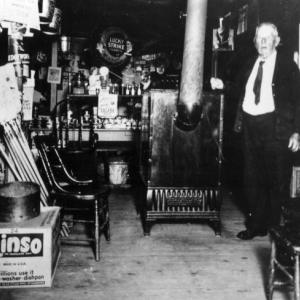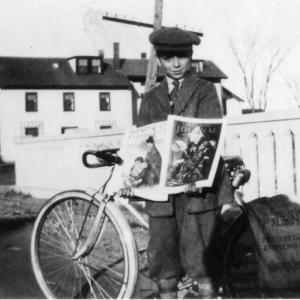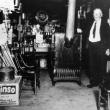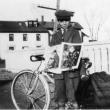This Week in Lincolnville: The summer she was 12
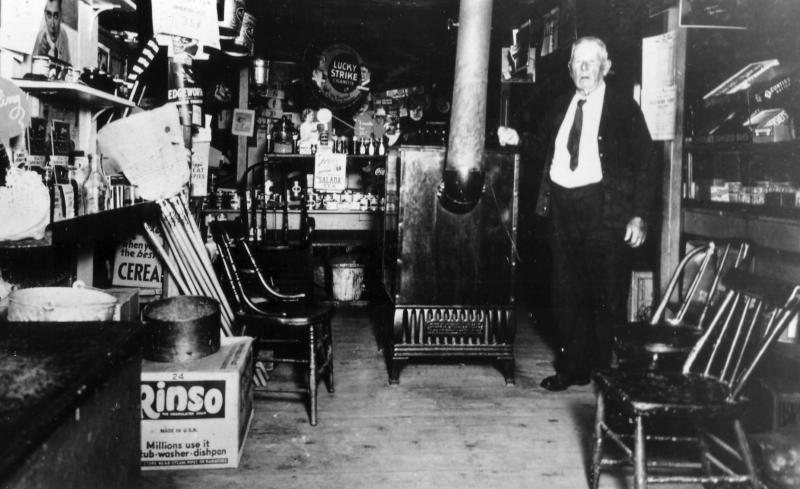 Charles Dearborn is seen inside his Lincolnville Beach store, which stood where the driveway of the Spouter Inn is today. An interior photo of a general store from this date, the 1930s, is a rarity. Charles’ granddaughter, Natalie, kept house for him the summer she was 12, in his apartment above the store.
Photo from the Lincolnville Historical Society
Charles Dearborn is seen inside his Lincolnville Beach store, which stood where the driveway of the Spouter Inn is today. An interior photo of a general store from this date, the 1930s, is a rarity. Charles’ granddaughter, Natalie, kept house for him the summer she was 12, in his apartment above the store.
Photo from the Lincolnville Historical Society
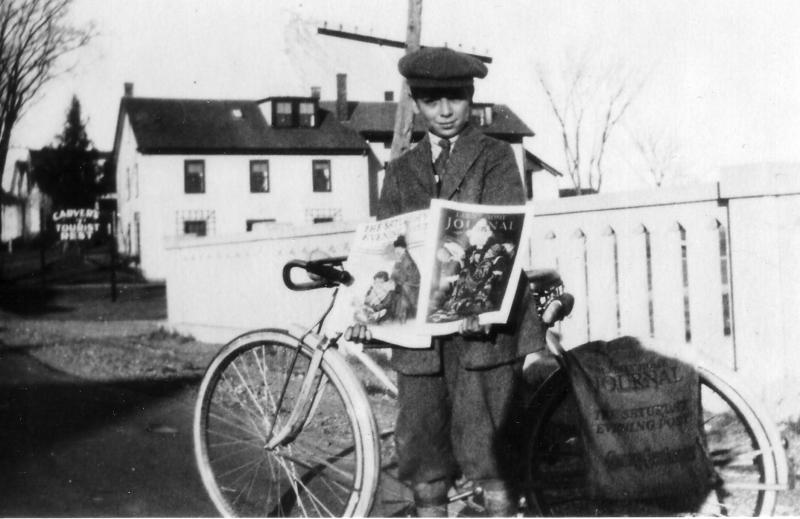 Young David Nichols, who went on to become a Maine Supreme Court Justice, displays copies of Grit, standing on Frohock Bridge; today’s Whales Tooth Pub is in the background.
Photo from the Lincolnville Historical Society
Young David Nichols, who went on to become a Maine Supreme Court Justice, displays copies of Grit, standing on Frohock Bridge; today’s Whales Tooth Pub is in the background.
Photo from the Lincolnville Historical Society
 A flying bat
Photo by Merlin Tuttle
A flying bat
Photo by Merlin Tuttle


 A needle-felted heron
Photo by Sue Stasiowski
A needle-felted heron
Photo by Sue Stasiowski
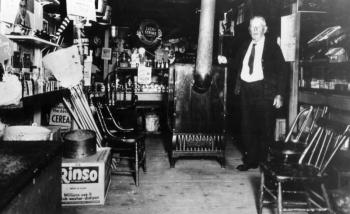 Charles Dearborn is seen inside his Lincolnville Beach store, which stood where the driveway of the Spouter Inn is today. An interior photo of a general store from this date, the 1930s, is a rarity. Charles’ granddaughter, Natalie, kept house for him the summer she was 12, in his apartment above the store.
Photo from the Lincolnville Historical Society
Charles Dearborn is seen inside his Lincolnville Beach store, which stood where the driveway of the Spouter Inn is today. An interior photo of a general store from this date, the 1930s, is a rarity. Charles’ granddaughter, Natalie, kept house for him the summer she was 12, in his apartment above the store.
Photo from the Lincolnville Historical Society
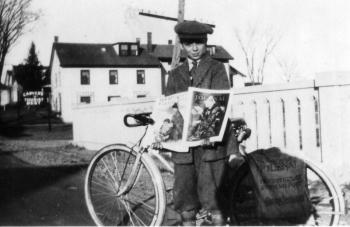 Young David Nichols, who went on to become a Maine Supreme Court Justice, displays copies of Grit, standing on Frohock Bridge; today’s Whales Tooth Pub is in the background.
Photo from the Lincolnville Historical Society
Young David Nichols, who went on to become a Maine Supreme Court Justice, displays copies of Grit, standing on Frohock Bridge; today’s Whales Tooth Pub is in the background.
Photo from the Lincolnville Historical Society
 A flying bat
Photo by Merlin Tuttle
A flying bat
Photo by Merlin Tuttle


 A needle-felted heron
Photo by Sue Stasiowski
A needle-felted heron
Photo by Sue Stasiowski
Have you read reports this past winter of the couple in Silver Spring, Md., who were investigated for neglect for allowing their two children, ages 10 and six, to walk home alone from the park? They’re actually referred to as “free range children”! Most of us who reached adulthood in the 60s or 70s shake our heads in disbelief, we of the generations who were sent outdoors after breakfast in the summer and not expected back inside until dark, when the streetlights came on or when our mothers finally hollered out the door to get home now!
Drive around town at school bus time today and see children waiting in the family car at the end of the driveway for the bus to come. Is it that an unattended walk of a few hundred feet down the driveway causes parents too much anxiety? Worry about the children standing alone out by the road? To be honest, though, my kids were picked up at the end of our driveway, a mere 30 feet from the house, and I could keep an eye on them from the window. And when our grandchildren take the bus from our house these days, both Wally and I are out there waiting with them. We could watch from the window, but enjoy the time with them too much to miss the minutes fooling around with the dog and the kids until the bus rounds the corner.
Somehow, in the years since I grew up roller skating alone around the block at the age of 10 (and my husband was hitchhiking from Augusta to the golf course in Manchester at age nine to hunt for golf balls, which he sold back to the golfers) parents’ anxiety level has escalated out of sight. Another recent news story, the discovery of what happened to six-year-old Etan Patz who disappeared in 1979 on the way to school at age six in New York City, is the case that long ago initiated my mother-anxiety, sitting in my Lincolnville home surrounded by three little boys, ages one, four and eight. Like many moms I had a too-vivid imagination. If it could happen to Etan’s mom whose distraught face I never forgot, it could happen to me.
And now, in 2015, here we all are, trapped by our own vivid imaginations. This hovering behavior, the helicopter parenting we read about, has, I believe caused us to infantilize our children well into their teens, coddling them, protecting them, scheduling them. By the time they ought to be stepping up and exhibiting adult behavior, they have no idea what that is. They’re so used to being told what to do, to being bailed out of problems, needled with constant texting from (probably) Mom but sometimes Dad, that they have no idea how to think for themselves. No tools to trust their own judgement. …
I’ll stop here, and share some vignettes from the good old days, when a 12-year-old kid was expected to look after a grandparent or a 14-year-old boy was trusted not to drift out to sea:
Natalie Macleod was 12 in 1933, the summer she kept house for her widowed grandfather, Charles Dearborn. She cooked and cleaned and kept him company. He lived over his store at Lincolnville Beach, where she loved listening to the old men who congregated there every day.
Ava Athearn’s mother, Mabel, took in elderly boarders, and the little girl enjoyed visiting them in their rooms. Ava’s grandparents, George and Sadie Athearn, lived with them as well. She was her blind grandfather’s eyes, and he was her best friend, as she led him around their farm, describing the sights to him.
Edgar Allen was a good-sized boy at 14 in 1938, the year he was in the eighth grade. Mornings, before school, he strapped on wooden skis made from barrel staves and a piece of inner tube, to cross the snowy fields to a neighbor’s farm and help milk thirty cows, then back home to milk his own family’s Jersey. Then, hurrying to the Miller School [on Tucker Brook Road, half a mile away], he brought in armfuls of wood and started the fire before the students and the teacher arrived, earning 50 cents a week.
Twelve-year-old David Nichols earned his first suit and long pants by selling Grit, a popular newspaper in rural Maine. Winnie Lamb sold Cloverene salve to her neighbors and relatives to buy a set of books she coveted. Child entrepreneurs continued past the Depression. Rosey Gerry was six in 1956 when he set out down Youngtown Road with a bag full of all-occasion cards, the Grit newspaper and a supply of Cloverene salve. He stopped in at every single house, where the people not only bought his cards and so on, but fed him milk and cookies besides. He eventually sold enough to earn an English bicycle, the only way he was going to get such a treasure. Fritz Trisdale made friends with his elderly Millertown neighbors at about the same time selling seeds.
Mac Carver, his brother, Jake and their friend Dick Elwell at Saturday Cove in Northport, packed up Dick’s wherry after school one Friday and motored over to Flat Island to spend the night camping. In the morning when they were ready to come back, an offshore breeze was blowing. Worried that it was too strong for the little outboard, the boys tied the wherry to a tree by a long line, then got in her and started up the motor. The line went taut; the motor couldn’t overcome the wind. They knew they would be blown out to sea if they attempted to cross the Bay. Later that day, and then the next morning, they repeated the exercise with the same result. Finally, after two nights on the island, the wind had died down enough that the line went slack, and the boys headed home. Weren’t their parents frantic with worry when their sons didn’t show up? It turned out that Dick’s father had been watching them from shore with binoculars throughout the weekend and saw that they were figuring out what to do.
Girls learned to cook and sew by watching their mothers and grandmothers. Boys helped their fathers build homemade tractors or fishing gear. They often ranged further afield than their sisters, learning blacksmithing and auto mechanics by observing those skills from the doorways of local tradesmen. Boys split and carried in firewood, girls watched younger siblings. Everyone helped in the garden. Both boys and girls had responsibilities at an early age for farm and household chores.
Natalie Macleod’s mother knew she would be good for the lonely grandfather. Winnie Lamb’s father taught her that she had to earn her own way. Dick Elwell’s dad expected his son to show good judgement. And so he did.
This story, and more from Lincolnville, can be found in Staying Put in Lincolnville, Maine 1900-1950, available at Western Auto, Schoolhouse Museum, and Sleepy Hollow Rag Rugs.
It’s time to think of our civic duty as Lincolnville residents – Town Meeting time. Once an iconic sign of spring, the annual meeting of townspeople was held on a Monday in March, Saturday in some towns, an all day affair including a slog through muddy roads to Tranquility Grange, a baked bean dinner at noon prepared by the womenfolk (long after they’d been granted The Vote the women were still down in the kitchen making biscuits and setting out the beans while the men were hashing over the hot issues of the day upstairs) and plenty of hard feelings to go around at the end of the day. Not much has changed, just the details. Now we do it in June – Thursday, June 11 this year, 6 p.m. in the school’s Walsh Common, no food, no mud (we hope), but undoubtedly at the end of it all there’ll be a few hard feelings. There’s always somebody who doesn’t get what they want, some vote that goes the wrong way.
Like our sister towns of Appleton and Liberty (the former with a nasty land use dispute and the latter with a divisive road closure) Lincolnville faces a tough decision: whether to discontinue four roads as town roads. The Selectmen were split 3-2 on whether to withdraw town support from Albert Blood Road, Lloyd Thomas Road, part of Martins Corner Road, and Thorndike Road. The Budget Committee decided to “Not Recommend” that three of those roads be discontinued, thereby disagreeing with the “Recommend” stamp conferred by the Selectmen. That’s a rarity in Lincolnville, that two boards disagree like that.
It comes down to money. The total package the town must come up with to discontinue the four roads, including $20,000 already spent on an assessor, is around $80,000, with $60,000 as compensation to the affected landowners. With the total length of the four roads under a mile, it could be 20 years before the town begins to see a savings on the measure.
Back to our civic duty. The Selectmen decided to put these measures on the written ballot which we will vote on Tuesday, June 9. Unfortunately, with no chance to discuss it in the open meeting Thursday, voters will have to rely on what they’ve already learned about it. Check out local newspapers/publications such as PenBay Pilot , Camden Herald,and Free Press for letters, articles, and opinion pieces, then make up your own mind.
CALENDAR
WEDNESDAY, June
All About Bats, 7 p.m., Lincolnville Library
THURSDAY, June 4
8th graders leave on class trip to Quebec
Free Soup Café, noon-1 p.m., Community Building, 18 Searsmont Road
FRIDAY, June 5
Children’s Story Time, 10 a.m., Lincolnville Library
SATURDAY, June 5
8th graders return from trip
Beach Farmers Market, 9 a.m. to 1 p.m., Dot’s parking lot
SUNDAY, June 7
Exhibit of paintings by Lesley Kristeller, 11 a.m. to 3 p.m., Community Building
Every week:
AA meetings, Tuesdays & Fridays at 12:15 p.m., Wednesdays & Sundays at 6 p.m.,United Christian Church
Lincolnville Community Library, open Tuesdays, 4-7, Wednesdays, 2-7, Fridays and Saturdays, 9 a.m.-noon. For information call 763-4343.
Soup Café, every Thursday, noon—1p.m., Community Building, Sponsored by United Christian Church. Free, though donations to the Good Neighbor Fund are appreciated
Schoolhouse Museum open by appointment only until June 2015: call Connie Parker, 789-5984
COMING UP
Tuesday, June 9, Election Day for Municipal Officials and referendum questions, 8 a.m. – 8 p.m.
Thursday, June 11, 6 p.m., Annual Town Meeting
Saturday, June 13, Needle Felting Workshop, 12:30-4:30 p.m., Library
June 18, 5:30 p.m. will be Eighth Grade graduation
June 20, a half day, will be the last day of school and Field Day
All About Bats
Annie Kassler of Bat Conservation International will present a free program on Wednesday, June 3 at 7 p.m. at the Lincolnville Community Library. According to Annie, “bats are among the most misunderstood and under-appreciated creatures on the planet. She says many people are surprised to learn that bats are gentle creatures that play an essential role in ecosystems and the global economy.” She will highlight the myths and facts about bats, white nose syndrome, and how to safely remove a bat from a house.
Bake Sale at Clean Bee
Clean Bee Laundry and the Temple family (of Lincolnville Beach) are holding their sxith annual bake sale to benefit Safe Passage on Saturday, June 6, from 9 a.m. to noon at Clean Bee Laundry, next to Reny's in Camden. Sisters, Liefe and Haydee Temple, ages 6 and 12, will bake and price items for the sale and be on hand to greet and help customers. They will also have information about the work that Safe Passage does in Guatemala. According to their mom, Jennifer Temple, “Safe Passage empowers the poorest, at-risk children of families working in the community of the Guatemala City Garbage Dump by creating opportunities and fostering dignity through the power of education. It was founded in 1999 by Maine native, Hanley Denning.”
"Guatemala is special to me because I was born there," says Haydee, a third year student at Children's House Montessori School in Camden. "And when I go back, I like to visit Safe Passage with my family. This time when we go back, I’m going to get to meet Cindy, the girl we sponsor, and we've been sending her letters and chapter books in Spanish. She just turned 12."
The Temples have supported Safe Passage in many ways over the years, from bringing extra toothbrushes in their luggage when they travel to Guatemala to donating the spare change left behind at Clean Bee Laundry to sponsoring students. Liefe, a sixth-grader at Islesboro Central School, plans to volunteer at Safe Passage on a service trip as soon as she is old enough. Joining the girls in the efforts this year will be the Rock Coast Rollers.” If you’d like to contribute baked goods to the sale, call the girls, 542-0505.
Also on Saturday the Lincolnville Farmers' Market will be set up in the Dot's Cafe parking lot from 9 a.m.-1 p.m. Fresh vegetables, grass-fed beef, eggs, and homemade jams from Ashgrove Farm, Donkey Universe Farm, Santoria Creations, and Murphy Family Farm are always there.
On Saturday, June 13, a needle felting workshop led by Sue Stasiowski will be held from 12:30 to 4:30 p.m. at the Lincolnville Community Library. Sue says, “Even though I’ve been needle felting for over eight years, I am still amazed at the beautiful pieces that can be made with wool, a small needle, and my imagination.” All materials, including a foam pad, wool fiber, felting needles and an instruction booklet, will be provided. The cost for materials is $10 and registration is required by email or phone, 763-4343. This workshop is supported by a grant from the Mudge Foundation.
We were sad to read that Dave “Leaky Boot” McPheters passed away a couple of weeks ago. We could always count on Leaky Boot, as everyone called him, to pick up our wayward dogs, JD, a Maine black dog and Bjelkie, a pure white Samoyed, when they went on their walkabouts. Dave would spy them trotting down the road, pull over and open his door. They’d hop right in and he’d bring them home. He had an amazing way with animals. Our sons remember raking blueberries with him years ago. Our sympathy to Sheila, his wife.
Event Date
Address
United States

